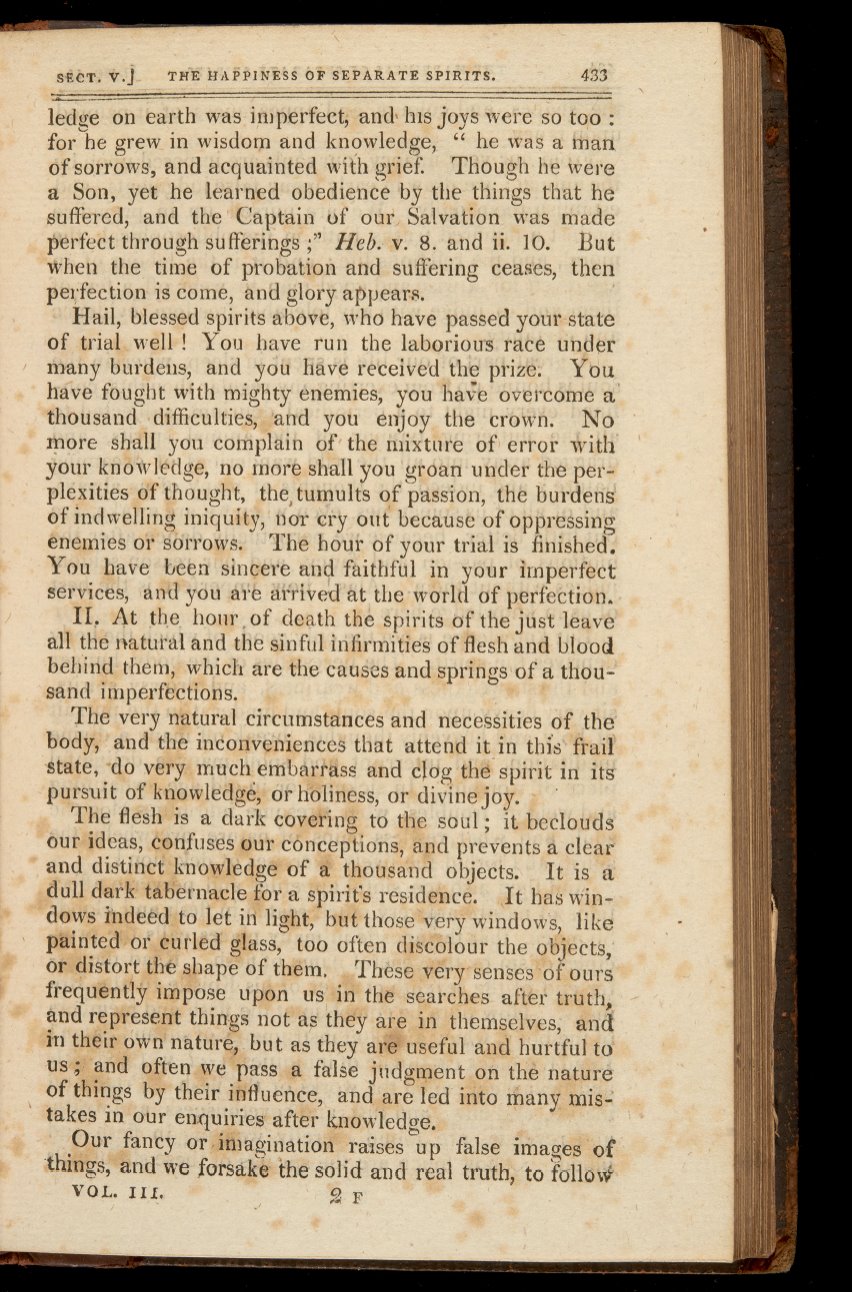

SECT.
V.j
THE
HAPPINESS
OF
SEPARATE
SPIRITS.
433
ledge
on
earth
was
imperfect, and
his
joys
were
so
too
:
for
he
grew in wisdom
and knowledge,
"
he
was
a man
of
sorrows,
and acquainted
with grief.
Though
he
were
a
Son,
yet
he
learned
obedience
by
the things
that
he
suffered,
and the
Captain of our
Salvation
was
made
perfect through
sufferings
;"
Heb.
v.
8.
and
ii. 10.
But
when
the
time
of
probation
and suffering ceases,
then
perfection
is
come,
and
glory
appears.
Hail,
blessed
spirits above,
who
have passed
your state
of
trial
well
!
You
have
run
the
laborious race
under
many burdens,
and
you
have received
the
prize.
You
have fought
with mighty enemies, you
have overcome
a
thousand
difficulties,
and
you
enjoy the
crown.
No
more
shall you
complain
of
the
mixture of
error
with
your
knowledge,
no
more shall
you
groan under
the
per-
plexities
of
thought, the tumults
of
passion, the
burdens
of
indwelling iniquity,
nor
cry
out
because
of
oppressing
enemies or
sorrows.
The hour of
your trial
is
finished.
You
have been sincere and faithful
in
your imperfect
services, and you
are arrived at
the world
of
perfection.
II.
At
the
hour
of
death
the
spirits
of
the
just
leave
all the
natural
and the
sinful
infirmities
of
flesh
and blood
behind
them, which
are
the
causes
and
springs
of
a
thou-
sand
imperfections.
The
very
natural circumstances and necessities
of
the
body,
and the inconveniences
that attend
it
in
this frail
state,
do very
rauch embarrass and clog the
spirit
in
its
pursuit
of
knowledge,
or
holiness,
or
divine
joy.
The
flesh
is
a
dark
covering to the soul
;
it
beclouds
our
ideas, confuses
our conceptions, and prevents
a
clear
and distinct
knowledge
of
a
thousand
objects.
It
is
a
dull
dark tabernacle
for
a
spirit's residence.
It
has win-
dows indeed
to
let
in
light,
but
those very
windows,
like
painted
or
curled
glass,
too often
discolour the
objects,
or distort
the
shape
of
them.
Thèse
very
senses
of ours
frequently
impose
upon
us
in the
searches after
truth,
and
represent
things
not
as
they
are
in themselves,
and
in
their
own
nature,
but
as they
are
useful
and hurtful
to
us
;
and often
we
pass a false
judgment
on the
nature
of
things
by
their
influence, and
are
led
into many
mis-
takes
in
our enquiries after
knowledge.
Our
fancy
or ,imagination raises up
false
images
of
things, and
we
forsake the solid and real truth,
to
follow'
VOL.
III.
F

















